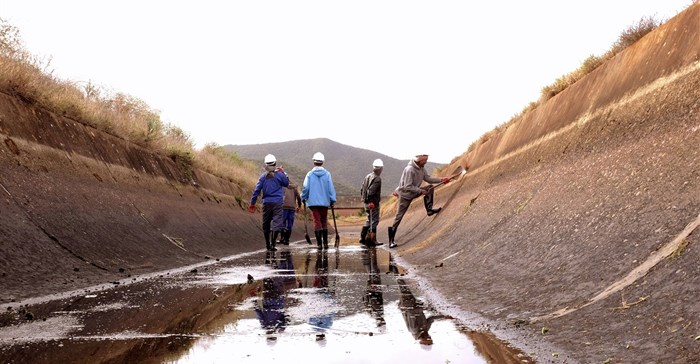
Compounding this is the bleak outlook for rain over the coming months, making the allocation of water resources a matter of life and death for many and a critical responsibility for the Gamtoos Irrigation Board (GIB).
All that can save us at this point is rain.
“The seasonal forecast, which works in three-month blocks and ends in July, does not look good,” said SA Weather Service spokesman with the Port Elizabeth office, Garth Sampson. “It shows ‘normal to below normal’ rainfall. We need above-normal.
“We need widespread rain of 50 millimetres or more to make any difference to our main storage dam levels. But it must be widespread and not, say, 55mm in Joubertina, 15mm in Kareedouw and 2mm in Patensie. It must be over 50mm throughout the region.”
The region’s biggest supply dam, the Kouga Dam outside Patensie, is sitting at 10.5% capacity (as of 16 April). In June, the Gamtoos Irrigation Board (GIB) and Department of Water Affairs officials must decide how to allocate the limited water ahead of the 2018/19 water year, which starts on July 1.

Rienette Colesky, GIB financial and HR manager, expressed concern about forthcoming water quotas. “We will have our annual session with the Department of Water Affairs and Nelson Mandela Bay Municipality in June to understand how much water is available in the Algoa system and what will be allocated to whom,” she said.
Marthinus Colesky was forced to stop producing vegetables in February. He inherited his farm, Skone Uitsig, from his grandfather who, like his father before him, was bought up prepared to shed “blood, sweat and tears” to keep the farm productive. “Many of our employees are sole breadwinners. Losing their jobs would be devastating, so instead of harvesting vegetables as they would normally be doing at this time of year, I am giving them maintenance and other jobs to do on the farm,” he said.
“We will start harvesting our oranges next month,” he said. “We have kept the trees alive using water-wise methods including drip irrigation and probes which tell us when the plants need water.
“However, we cannot escape the fact that these are extremely desperate times. Without rain, we could lose all our trees, which take up to five years to replace.”
Kaya Katoo, a farmer in the area since 2003, echoed his neighbour’s sentiments. “We have been through drought before, but never one as bad as this,” Katoo said. “We are desperately trying not to lay staff off, but it’s difficult. We have been forced to make cut-backs and are trying to avoid more.”
The only thing that Katoo is sure of is that he will have a crop of oranges this year. “That’s the good news,” he said. “However, the quality of what little water we have is compromised. Without good rain – and soon – the younger trees will die and with them all the money, and hope we have for the future, will perish too.”
Farming maize, lucerne, vegetables and melons, Rudolf Rose of Melon Farm has had to cut back but is still managing to produce, albeit in reduced quantities. “It’s a real challenge,” he said. “We only water at night, but with quotas possibly being reduced even further, we are now really desperate. All that can save us at this point is rain.”
Part and parcel of GIB’s role in ensuring that water gets to farmers in the Gamtoos Valley is the annual shutdown of their water canals for two weeks of maintenance. This annual exercise has ensured that water losses from leaks or damaged infrastructure are of the lowest countrywide – less than 8% from this open system.
The main canal will be shut down for two weeks from 17 June, while smaller canals will be closed from 5 May. Affected farmers are given prior warning and water is stored in reservoirs by water users for the duration of the shutdown to ensure the uninterrupted supply of water.
GIB has undertaken to use local residents who have been unemployed as a result of the drought to assist with the maintenance of the canals.